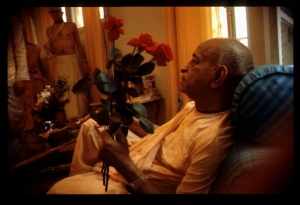SB 8.16.55: Difference between revisions
m (1 revision(s)) |
No edit summary |
||
| Line 1: | Line 1: | ||
{{info | {{info | ||
|speaker= | |speaker=Kaśyapa Muni | ||
|listener=Aditi, | |listener=Aditi, wife of Kaśyapa Muni | ||
}} | }} | ||
[[Category:Srimad-Bhagavatam - Canto 08 Chapter 16]] | |||
[[Category:Bhagavatam Verses Spoken by Kasyapa Muni - Vanisource|081655]] | |||
<div style="float:left">'''[[Srimad-Bhagavatam]] - [[SB 8|Eighth Canto]] - [[SB 8.16: Executing the Payo-vrata Process of Worship|Chapter 16: Executing the Payo-vrata Process of Worship]]'''</div> | |||
<div style="float:right">[[File:Go-previous.png|link=SB 8.16.54]] '''[[SB 8.16.54]] - [[SB 8.16.56]]''' [[File:Go-next.png|link=SB 8.16.56]]</div> | |||
{{RandomImage}} | |||
==== TEXT 55 ==== | ==== TEXT 55 ==== | ||
<div | <div class="verse"> | ||
dakṣiṇāṁ gurave dadyād | :dakṣiṇāṁ gurave dadyād | ||
ṛtvigbhyaś ca yathārhataḥ | :ṛtvigbhyaś ca yathārhataḥ | ||
annādyenāśva-pākāṁś ca | :annādyenāśva-pākāṁś ca | ||
prīṇayet samupāgatān | :prīṇayet samupāgatān | ||
</div> | </div> | ||
| Line 17: | Line 22: | ||
==== SYNONYMS ==== | ==== SYNONYMS ==== | ||
<div | <div class="synonyms"> | ||
''dakṣiṇām''—some contribution of money or gold; ''gurave''—unto the spiritual master; ''dadyāt''—one should give; ''ṛtvigbhyaḥ ca''—and to the priests engaged by the spiritual master; ''yathā-arhataḥ''—as far as possible; ''anna-adyena''—by distributing prasāda; ''āśva-pākān''—even to the caṇḍālas, persons habituated to eating the flesh of dogs; ''ca''—also; ''prīṇayet''—one should please; ''samupāgatān''—because they have assembled there for the ceremony. | |||
</div> | </div> | ||
| Line 24: | Line 29: | ||
==== TRANSLATION ==== | ==== TRANSLATION ==== | ||
<div | <div class="translation"> | ||
One should satisfy the spiritual master and assistant priests by giving them cloth, ornaments, cows and also some monetary contribution. And by distributing prasāda one should satisfy everyone assembled, including even the lowest of men, the caṇḍālas [eaters of dog flesh]. | One should satisfy the spiritual master and assistant priests by giving them cloth, ornaments, cows and also some monetary contribution. And by distributing prasāda one should satisfy everyone assembled, including even the lowest of men, the caṇḍālas [eaters of dog flesh]. | ||
</div> | </div> | ||
| Line 31: | Line 36: | ||
==== PURPORT ==== | ==== PURPORT ==== | ||
<div | <div class="purport"> | ||
In the Vedic system, prasāda is distributed, as recommended here, without discrimination as to who may take the prasāda. Regardless of whether one be a brāhmaṇa, śūdra, vaiśya, kṣatriya, or even the lowest of men, a caṇḍāla, he should be welcome to accept prasāda. However, when the caṇḍālas, the lower class or poorer class, are taking prasāda, this does not mean that they have become Nārāyaṇa or Viṣṇu. Nārāyaṇa is situated in everyone's heart, but this does not mean Nārāyaṇa is a caṇḍāla or poor man. The Māyāvāda philosophy of accepting a poor man as Nārāyaṇa is the most envious and atheistic movement in Vedic culture. This mentality should be completely given up. Everyone should be given the opportunity to take prasāda, but this does not mean that everyone has the right to become Nārāyaṇa. | In the Vedic system, ''prasāda'' is distributed, as recommended here, without discrimination as to who may take the ''prasāda''. Regardless of whether one be a ''brāhmaṇa'', ''śūdra'', ''vaiśya'', ''kṣatriya'', or even the lowest of men, a ''caṇḍāla'', he should be welcome to accept ''prasāda''. However, when the ''caṇḍālas'', the lower class or poorer class, are taking ''prasāda'', this does not mean that they have become Nārāyaṇa or Viṣṇu. Nārāyaṇa is situated in everyone's heart, but this does not mean Nārāyaṇa is a ''caṇḍāla'' or poor man. The Māyāvāda philosophy of accepting a poor man as Nārāyaṇa is the most envious and atheistic movement in Vedic culture. This mentality should be completely given up. Everyone should be given the opportunity to take ''prasāda'', but this does not mean that everyone has the right to become Nārāyaṇa. | ||
</div> | </div> | ||
__NOTOC__ | |||
<div style="float:right; clear:both;">[[File:Go-previous.png|link=SB 8.16.54]] '''[[SB 8.16.54]] - [[SB 8.16.56]]''' [[File:Go-next.png|link=SB 8.16.56]]</div> | |||
__NOTOC__ | |||
__NOEDITSECTION__ | |||
Revision as of 17:16, 2 July 2021

A.C. Bhaktivedanta Swami Prabhupada
TEXT 55
- dakṣiṇāṁ gurave dadyād
- ṛtvigbhyaś ca yathārhataḥ
- annādyenāśva-pākāṁś ca
- prīṇayet samupāgatān
SYNONYMS
dakṣiṇām—some contribution of money or gold; gurave—unto the spiritual master; dadyāt—one should give; ṛtvigbhyaḥ ca—and to the priests engaged by the spiritual master; yathā-arhataḥ—as far as possible; anna-adyena—by distributing prasāda; āśva-pākān—even to the caṇḍālas, persons habituated to eating the flesh of dogs; ca—also; prīṇayet—one should please; samupāgatān—because they have assembled there for the ceremony.
TRANSLATION
One should satisfy the spiritual master and assistant priests by giving them cloth, ornaments, cows and also some monetary contribution. And by distributing prasāda one should satisfy everyone assembled, including even the lowest of men, the caṇḍālas [eaters of dog flesh].
PURPORT
In the Vedic system, prasāda is distributed, as recommended here, without discrimination as to who may take the prasāda. Regardless of whether one be a brāhmaṇa, śūdra, vaiśya, kṣatriya, or even the lowest of men, a caṇḍāla, he should be welcome to accept prasāda. However, when the caṇḍālas, the lower class or poorer class, are taking prasāda, this does not mean that they have become Nārāyaṇa or Viṣṇu. Nārāyaṇa is situated in everyone's heart, but this does not mean Nārāyaṇa is a caṇḍāla or poor man. The Māyāvāda philosophy of accepting a poor man as Nārāyaṇa is the most envious and atheistic movement in Vedic culture. This mentality should be completely given up. Everyone should be given the opportunity to take prasāda, but this does not mean that everyone has the right to become Nārāyaṇa.